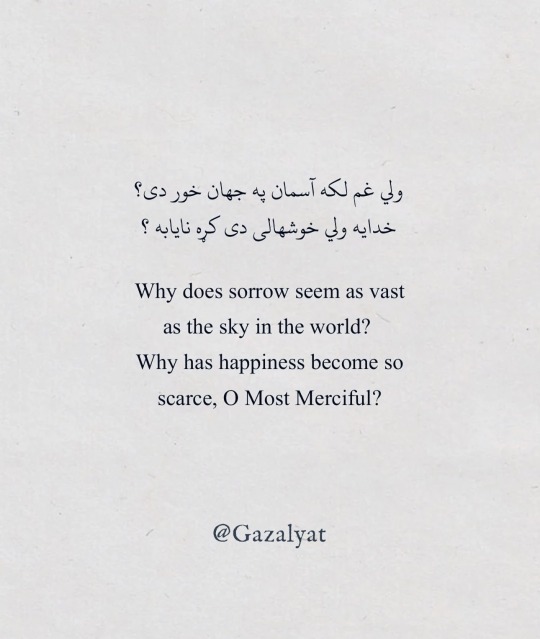#ghani khan
Text
خندا به مومي، چې خندا وېشي
To find laughter around you, you must first distribute smiles.
#pashto#pashto-literature#lit#pashto lines#pashto poetry#pashto shayari#pashto literature#poetry#ghani khan
409 notes
·
View notes
Text
ده سر ده سترګو نه مې پناه يي,
ده زړه په سترګو دې هر وخت ديدن کومه.
Hidden from my sight,
Yet i see you within my heart.
54 notes
·
View notes
Text
Afghanistan
Afghanistan is a landlocked country in South Asia, located at the crossroads of Central Asia and South Asia. It is bordered by Pakistan to the east and south, Iran to the west, Turkmenistan, Uzbekistan, and Tajikistan to the north, and China to the northeast. Afghanistan has a long and complex history, and has been the site of many conflicts and invasions throughout its history. In this essay, we…
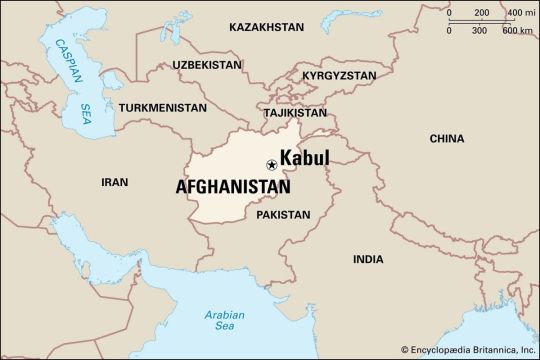
View On WordPress
#Achaemenid Empire#Alexander the Great&039;s empire#ashak#Ashraf Ghani#Central Asia#Hephthalite Empire#Herat#Hindu Kush#ISIS#Islam#Jalalabad#Kabul#kabuli palaw#Kandahar#landlocked#mantu#Mazar-i-Sharif#Mohammed Daoud Khan#mountainous#Pamir mountain ranges#Silk Road#South Asia#Taliban#the Kushan Empire#the Maurya Empire
0 notes
Text
Bigg Boss 16: Salman Khan के साथ फिर नजर आएंगी Shehnaaz Gill, वीकेंड के वार में होगी एंट्री
Bigg Boss 16: Salman Khan के साथ फिर नजर आएंगी Shehnaaz Gill, वीकेंड के वार में होगी एंट्री
Bigg Boss 16: Shehnaaz Gill एक बार फिर Salman Khan के साथ नजर आएंगी। वो बिग बॉस के वीकेंड के वार में एंट्री लेती दिखेंगी। शो में शहनाज अपने गाने घनी स्यानी को प्रमोट करने पहुंचेंगी।
Bigg Boss 16: रिएलि��ी शो बिग बॉस (Bigg Boss) के 13वें सीजन में नजर आने के बाद से लगातार पॉपुलर होती जा रही पंजाबी गर्ल शहनाज गिल (Shehnaaz Gill) एक बार फिर बिग बॉस में नजर आने वाली हैं। वो एक्टर और शो के होस्ट सलमान…

View On WordPress
#age of shehnaaz gill#age of sidharth shukla and shehnaaz gill#arbaaz khan and salman khan#Bigg Boss#Bigg Boss 16#bigg boss 16 all episode#bigg boss 16 before tv timing#bigg boss 16 contestants name list with photo#bigg boss 16 elimination list#bigg boss fame shehnaaz gill#Bollywood#Entertainment#Ghani Syaani Song#Ghani Syaani Song Out#katrina kaif and salman khan#mahira sharma and shehnaaz gill friendship#sajid khan and salman khan movie#salman khan#Salman Khan and Shehnaaz Gill#Salman Khan photo#Salman Khan photoshoot#salman khan video#Shalin Bhanot#Shehnaaz Gill#shehnaaz gill after sidharth shukla death#shehnaaz gill and diljit dosanjh movie#shehnaaz gill and raghav#shehnaaz gill and salman khan#shehnaaz gill and salman khan movie#shehnaaz gill and sidharth shukla
0 notes
Text



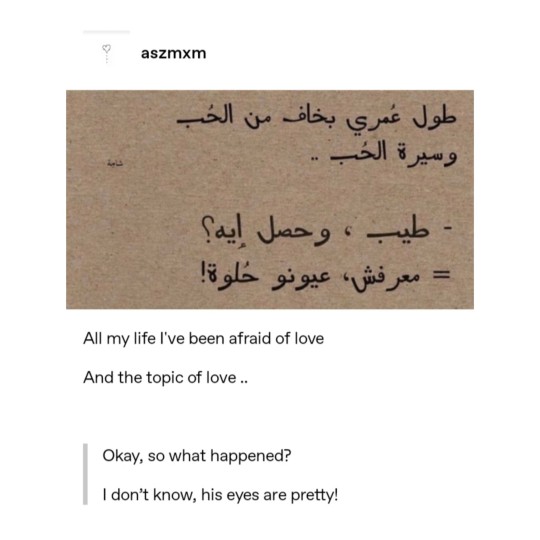

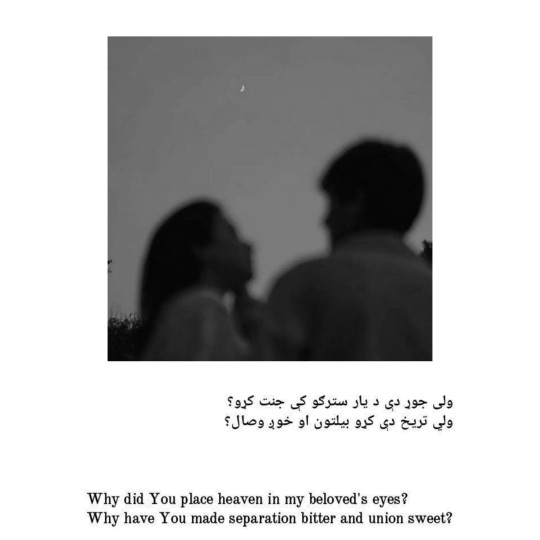


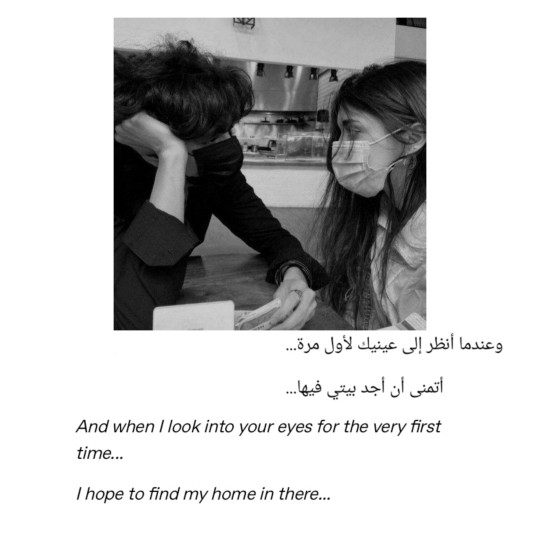

Arabic x Eyes
{ Unknown/ Unknown/ Unknown/ Tumblr user: @aszmxm/ Adham Alsharkawi (via Tumblr user: @letsbelonelytogetherr)/ Ghani Khan/ Unknown/ Mahmoud Darwish/ Tumblr User: @msanonymous (via Instagram)/ Originally by E. E. Cummings (Arabic translation- Unknown) }
#I've tried finding the name of all the writer's#but still failed badly so if anyone knows anything about the work mentioned above please lmk#arabic language#arabic literature#arabic poetry#arabic lines#arabic#web weave#web weavings#web weaving#literary parallels#parallels#on eyes#arabic x eyes#dark acadamia quotes#poets on tumblr#poets corner#poem#poems on tumblr#dark academia poetry#poetry#writers and poets#books#books and literature#literature#urdu literature#classic literature#classic lit quotes#excerpts#fragments
468 notes
·
View notes
Text

To find laughter around you , you must first distribute smiles.
~Ghani Khan
111 notes
·
View notes
Text
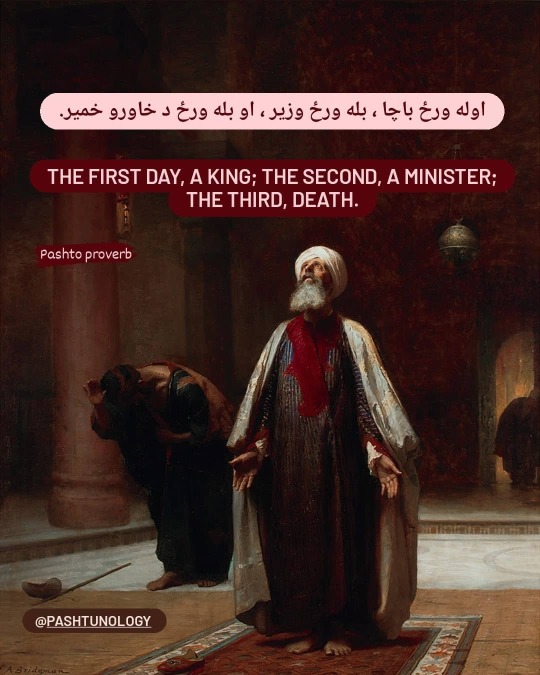
Transliteration:
"Awala wraz baachaa, bala wraz wazir, aw bala wraz da khawro khamir"
The cycle of life is joy, worry and death. A youth is considered free of worry and free to enjoy himself, such as a king should be. The mature man, like a Prime Minister, has the responsibilities and worries attendant upon administering a country.
Alternatively, it is about the untrustworthiness and changing scenarios of life.
The idiom used for death is literally "the yeast (leaven) of dirt" (khawro khamir). When Pashtuns make bread (nän), they leaven it by adding a little bit of yeast (khamir) kept back from the previous batch. In the picturesque language of this rhyming proverb, even the mighty king and wazir (minister) become khamir (yeast) that is added to the earth as part of the cycle of life.
This proverb reminds me of a couple of lines by Ghani Khan.
پرون تخم وم، نن ګل یم، سبا بیا به خاؤره کېږم
زه د باد یوه څپه یم، په صحـــــرا په باغ تېرېږم
"Yesterday a seed, today a flower, tomorrow I’ll turn to dust;
I am a gust of wind blowing over the desert garden"
#afghanistan#pashto#pashtun#afghan#art#literature#proverbs#idioms#pashto poetry#poetry#middle east#central asia#افغانستان#khyber pakhtunkhwa#kandahar#kabul#peshawar#pashtunology
32 notes
·
View notes
Text
The Forgotten Hero: How Russia Helped Launch The Decolonial Movement in The Heart of The British Empire
Rafiq Ahmed, Who Founded the Communist Party of India in Tashkent, Gave His Descendants Both a Legacy and a Name, But Hardly Any of Them Know Why They Are Called ’Roosis’
— December 5, 2023 | RT

Rafiq ‘Roosi’ Ahmed died four decades ago, but his visits to the erstwhile Union of Soviet Socialist Republics (USSR) are forgotten, to the extent that his descendants, who continue to be known as the ‘Roosis’ (Hindi/Urdu for Russian national) of Bhopal, are unsure of the origin of the name they carry, and are ignorant of his illustrious legacy.
After battling lung cancer for three years, Comrade ‘Roosi’ died as quietly as he had lived, in the central Indian city of Bhopal at the age of 93, in 1982.
Bhopal had been run by the Nawabs during British rule, from 1818 to 1947, after which it became part of the Indian Union; since then, the socio-political fabric of the city has changed radically. Roosi’s travels to the USSR in 1920, inspired by the great revolutionary upsurge in Russia and Central Asia, have largely been forgotten.
Rafiq Ahmed's ancestral home is a stone’s throw from the picturesque Upper Lake in a typically non-descript narrow bylane in the old quarters of Bhopal, but it is easy to find – thanks to the title, Roosi. Apart from a handful of senior residents of the city, nobody quite knows the origin of this name.
His daughter-in-law Saulat has done a fine job of keeping his belongings safe – especially those pertaining to his trip to the Soviet Union in September-October 1967 to attend the 50th anniversary of the Great October Socialist Revolution – but the family’s collective knowledge is limited to his second trip to Russia, and some anecdotes from his first visit which border on the mythical.
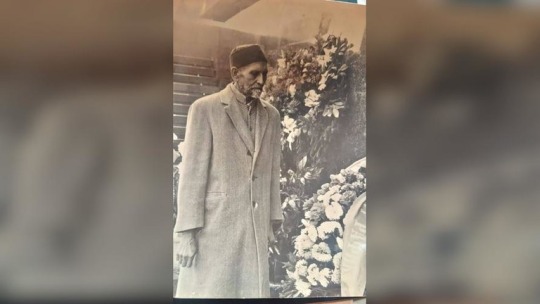
Comrade Rafiq Ahmad, personal archive © RT
They are unaware that Roosi was among the first group of Indian revolutionaries who went to the Soviet Union to seek advice on ousting their British colonial rulers, or that he was among the first to enroll at the Indian Military Training School in Tashkent, or was the founding member of the Communist Party of India in Tashkent, or was tried and jailed for almost a year in the Peshawar Conspiracy Case.
Septuagenarian Khalid Ghani, who knows Bhopal’s history and its people like the back of his hand, attributes this to Roosi’s modest lifestyle. The Ghanis and his family have been neighbors and go back a long way. Ghani’s family used to run a sports shop on the ground floor, and Roosi’s son ran a small hotel called ‘Moonlight’ on the first floor of the same building.
When Ahmed came back from Russia in 1923, people started calling him ‘Roosi’. “He had rubbed shoulders with the top Indian and Russian revolutionaries there, risked his life, and had been jailed. But he didn’t speak about it to anyone, let alone brag about his stay there. Even after the independence of India, he did not list himself as a freedom fighter and avail benefits – such as seeking a plot of land – and secure his future. He just went back to being the person he was before he had left Bhopal. This says a lot about the kind of man he was,” says Ghani.
Modest Background
Roosi hailed from a modest background, and when he returned from Russia, he took a job as the head of the kitchen of the last ruler of Bhopal, Nawab Hameedullah Khan. Much later, when his son Jameel opened his own restaurant, Roosi started assisting him.
Jameel’s wife, Saulat, and his sister, Rafia-un-Nisa, are the two surviving members of the family who spent time with Roosi. Rafia-un-Nisa is in her late eighties and can barely speak. Saulat married into the family in 1969, five decades after Roosi returned from Russia.
Although she is alert and can recall most details about her father-in-law, she is unable to piece together the sequence of events of his life before she married into the family.
“He would be at the hotel during the day and spend the nights writing. I saw him do that for eight years. It is unfortunate that we cannot find most of his writings,” she laments. She pulls out a newspaper clipping to show that Roosi was among the first Indians to write a book on Vladimir Lenin in 1923. However, she has no idea where the book is.

Comrade Rafiq Ahmad (center) meets with youths of the Soviet Union in the city of Kirov. © Sputnik/I. Agranovskiy
Trip to Russia
Roosi’s long period of anonymity ended quite suddenly when Soviet Land magazine published an article on him in around 1966-1967. He was invited to the Soviet embassy in New Delhi and before he knew it, he was on his way to Moscow.
In between, there were mentions of him in the writings of fellow compatriots such as Shaukat Usmani, but they seem to have gone unnoticed.
Ghani recalls, “Nearly five decades after he had returned from Russia, Ahmed was invited to meet the Soviet ambassador in New Delhi. In 1967, he flew to Russia to take part in the 50th anniversary of the Great October Socialist Revolution. Later in 1972, he was acknowledged as a freedom fighter at former prime minister Indira Gandhi’s behest.”
In Moscow, he was awarded a gold medal for his struggle alongside Russian revolutionaries. After receiving the medal, he told Patriot newspaper that the revolutionaries who languished in jail and died there deserved the decoration more than him.
“Twenty of my comrades died fighting there. They were all courageous people…I think they deserved this honor much more than me,” he said, adding that he was held hostage in Kerki (in modern-day Turkmenistan) for over a month along with 36 other Indians, as well as Russian and Turkmen revolutionaries. He spoke about how the British tortured the revolutionaries.
He visited Lenin’s mausoleum and placed a wreath there. He told the newspaper New Age that he had seen Lenin addressing a meeting once, but he could not meet him in person alongside his Indian comrades as he had fallen ill, and this was his greatest misfortune. New Age newspaper then described him as a tall and energetic man.
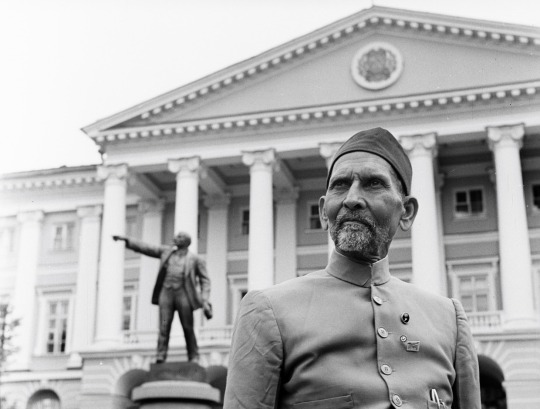
Comrade Rafiq Ahmad with a monument of Vladimir Lenin at Smolny, in Leningrad (N ow St. Petersburg). Ahmad met Lenin in 1921. © Sputnik/Mikhail Ozerskiy
Roosi reunited with other revolutionaries in Moscow; among them was Maria Fortus. She had been his teacher at the Communist University of the Toilers of the East, in Moscow, and remembered all her Indian students by their names. She recognized Roosi and asked him about the other Indian revolutionaries. He also met Avanes Baratov, an old Communist who had participated in the struggle against the counter-revolutionary bands.
Roosi, who was hosted by APN Board (Novosti Press Agency), visited Kerki, where he had fought alongside the Red Army, and Tashkent, where he went to a school where children were taught Urdu. Saulat has a couple of photos of him with Fortus and Baratov, and of his visits to Tashkent and Kerki.
Later that year, he was decorated with another medal by the Soviet Ambassador to New Delhi, N.M. Pegov.
In 1972, he was among the few freedom fighters to be invited to New Delhi by the government of India to celebrate the silver jubilee of India’s Independence.
Roosi’s Journey
A few years after his death, a portion of Roosi’s missing memoir was published in Qazi Wajdi-ul-Hussaini’s book “Barkatullah Bhopali” in 1986.
According to Hussani, when the Khilafat Movement was in full swing in 1920, the Khilafat Committee of Delhi announced a conference and an emotionally charged and rather naïve group of Bhopalis headed for Delhi, believing that this was a call to rid India of the British.
Apart from Roosi, the fiery group included Aftab Ali Khan, Mohammed Ali, Abdul Hayi, Master Mashkoor, Mohammed Khan, Ahmed Kabeer Ahmed, Mohammed Shafi and Mohammed Akhtar.
These revolutionaries stood out among the others when they literally kicked a spy out from their group, and stopped the Imam of Delhi’s Jama Masjid from leading the prayers, as he was said to be close to the British.

Comrade Rafiq Ahmad visiting USSR © RT
However, when they learnt that this was a call to protest against the British stance towards the Turkish Caliphate, a few of Roosi’s companions decided to return to Bhopal. The rest decided to go ahead with the “Hijrat” (Migration), impressed by the enthusiastic call given by Afghanistan’s King Amanullah Khan, and set out for Kabul.
They crossed the border from Peshawar and entered Afghanistan, and headed towards Kabul via Jalalabad. They met King Amanullah Khan, who received them well, but ordered that the refugees be sent to Jabal al-Siraj (a former palace he used as a military base). When the Emir promised to give them jobs, it dawned on the group that he was buying time to strike a deal with the British.
Disappointed, the group escaped from Jabal al-Siraj, covering 30 to 40 miles on foot each day, crossing difficult mountains and treacherous deserts, and reached the Turkistan border, and then finally Termez via Mazar-i-Sharif and Ghor. In Termez, they heard the fiery speech of a Russian commander who said his country had opened its doors to the workers of the world. They met the commander and went to Tashkent with his help.
In ‘The Indian Revolutionaries and the Bolsheviks - their early contacts, 1918-1922’, Arun Coomer Bose writes, “We have it on the authority of Rafiq Ahmed (Roosi) that the first four ‘muhajirs’ (Migrants), including himself, reached Kabul sometime in May 1920. They were well received, and were lodged at Jabal us-Siraz (Jabal al-Siraj), at some distance from Kabul. Others, who came after them, were also brought there, and by the beginning of July there were about a couple of hundred of them at Jabal us-Siraz (Jabal al-Siraj).”
After the founding of the Communist Party of India in Tashkent, it was decided that some of the Indian ‘Muhajirs’ would return to India to establish the foundations of a communist movement there.
Accordingly, towards the end of March 1922, a bigger group of ten, which included Roosi, set out for India via the Pamir route, writes Bose. “At Kharog they divided themselves into small groups and, barring a couple of them, succeeded in reaching Chitral or the tribal territories in the north-west of India. But, almost all of them were apprehended by the Indian police, and were tried in the Peshawar Conspiracy Case,” adds Bose.
Roosi was jailed for nearly a year. A letter issued by the Government of India on December 25, 1972 states that Roosi was arrested in the Peshawar Conspiracy Case (Crown vs Akbar Shah and seven others in the Moscow Tashkent conspiracy case) in the last week of October 1922 and released on May 18, 1923, and that he spent his term in the District Jail in Peshawar.
Saulat’s son now runs the family restaurant, which serves Mughlai cuisine. Her daughter, Bushra, who was eight years old when Roosi passed away, has taken charge of her grandfather’s papers and plans to preserve them.
The next generation of Roosis are unaware of their great-grandfather’s lineage, content with the knowledge that he visited Russia. Can, then, one blame the rest of Bhopal?
— By Lamat R Hasan, an Independent Journalist Based in Delhi
#Feature#Rafiq Ahmed#Rafiq ‘Roosi’ Ahmed#Union of Soviet Socialist Republics (USSR)#Hindi/Urdu for Russian National#Bhopal | India 🇮🇳#Russia 🇷🇺#British 🇬🇧 Empire#“Hijrat” (Migration)#Tashkent | Capital of Uzbekistan 🇺🇿 Now#Peshawar (Now City of Pakistan 🇵🇰)#Kabul | Jalalabad | Afghanistan 🇦🇫#King Amanullah Khan#Indian Revolutionaries & Bolsheviks#Turkistan#Termez | Mazar-i-Sharif | Ghor#Kabul#Muhajirs#Mughlai Cuisine
2 notes
·
View notes
Text
لکه شمه بدنصیبه
Like an unfortunate candle,
يا به سوزم یا به مرمه
It's in my fate to either burn or die.
#pashto#lit#pashto-literature#pashto lines#pashto poetry#pashto shayari#pashto literature#ghani khan#poetry#pashto ghazal
387 notes
·
View notes
Text
د ګلو څانګې ولې چپ شوئ,
O branch of a rose, why did u go quiet,
په زړه دئ څه دي راته اوايه حالونه.
What's in your heart, tell me everything.
173 notes
·
View notes
Text
" Stargo da janan ke zma khkuly jahanoona di,
Wa dekhla dunia za oogay sta da dunia na yama."
"In my lover's eyes I have my beautiful worlds,
Take your world, I am not hungry for your world."
- Ghani Khan
#writing#poetry#tumblrpost#literature#relatable#art#dark academia#lit#pashto#spilled words#spilled ink#spilled thoughts
4 notes
·
View notes
Text
PPP withdraws candidate in favour of MQM for NA-245 by-poll
PPP withdraws candidate in favour of MQM for NA-245 by-poll
Sindh Labour and Human Resources Minister Saeed Ghani (L) and PPP leader Danish Khan speaking during a video message in Karachi. — Provided/File
KARACHI: PPP on Friday announced the withdrawal of its candidate Danish Khan in favour of MQM Pakistan for the upcoming NA-245 by-polls in Karachi.
Sindh’s Labour and Human Resources Minister Saeed Ghani, in a video message, said that the party decided…

View On WordPress
5 notes
·
View notes
Text
“Stargo da janan ke zma khkuly jahanoona di, Wa dekhla dunia za oogay sta da dunia na yama.”
In my lover's eyes i have my beautiful worlds, Take your world, i am not hungry for your world.
Ghani Khan
2 notes
·
View notes
Text
Ghani Syaani Song Out: Shehnaaz Gill ने दिखाई ग्लैमरस अदाएं, हरियाणवी में MC Square संग किया रैप
Ghani Syaani Song Out: Shehnaaz Gill ने दिखाई ग्लैमरस अदाएं, हरियाणवी में MC Square संग किया रैप
Ghani Syaani Song Out: Shehnaaz Gill और MC Square का गाना घनी स्यानी रिलीज हो गया। गाने में शहनाज ग्लैमरस अवतार में नजर आईं हैं। उन्होंने एमसी स्क्वैर के साथ हरियाणवी में रैप किया है।
Ghani Syaani Song Out: पॉपुलर पंजाबी सिंगर और एक्ट्रेस शहनाज गिल (Shehnaaz Gill) और एमसी स्क्वैर (MC Square) का मचअवेटेड सॉन्ग घनी स्यानी (Ghani Syaani) अब रिलीज हो गया है। इस गाने की चर्चा पिछले कुछ दिनों से काफी…

View On WordPress
#age of shehnaaz gill#age of sidharth shukla and shehnaaz gill#Bigg Boss#bigg boss fame shehnaaz gill#Bollywood#Entertainment#Ghani Syaani Song#Ghani Syaani Song Out#mahira sharma and shehnaaz gill friendship#Shehnaaz Gill#shehnaaz gill after sidharth shukla death#shehnaaz gill and diljit dosanjh movie#shehnaaz gill and raghav#shehnaaz gill and salman khan#shehnaaz gill and salman khan movie#shehnaaz gill and sidharth shukla#Shehnaaz Gill animal print outfit#shehnaaz gill awards#shehnaaz gill bigg boss#shehnaaz gill bold#Shehnaaz Gill Ghani Syaani#shehnaaz gill height#Shehnaaz Gill Hot#Shehnaaz Gill latest photos#Shehnaaz Gill new photo#Shehnaaz Gill photos#Television#बिग बॉस#बॉलीवुड#शहनाज गिल
0 notes
